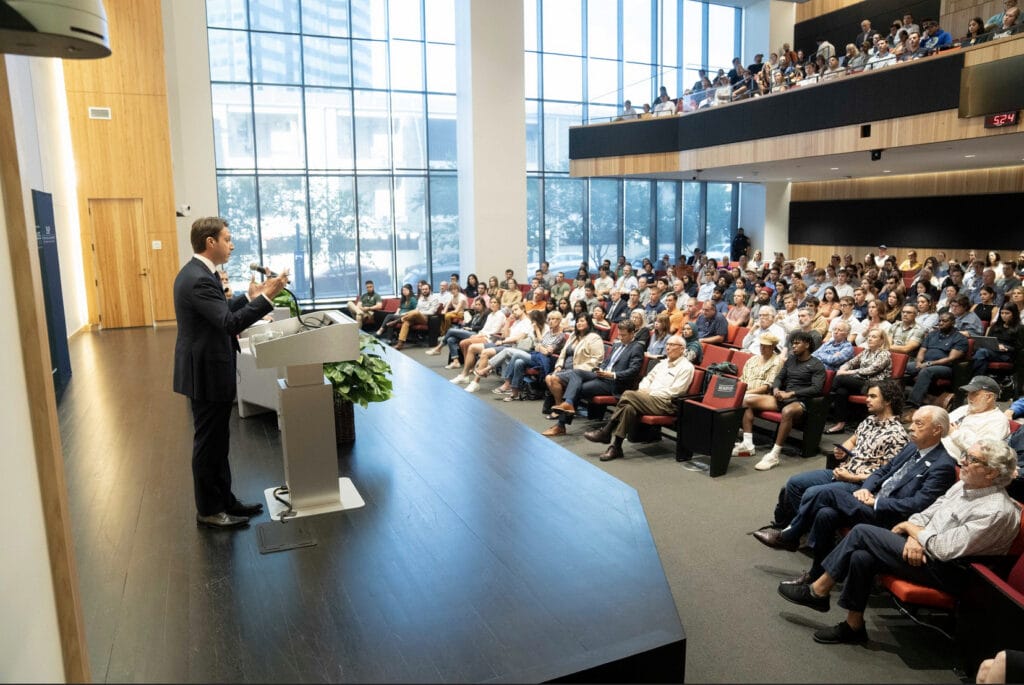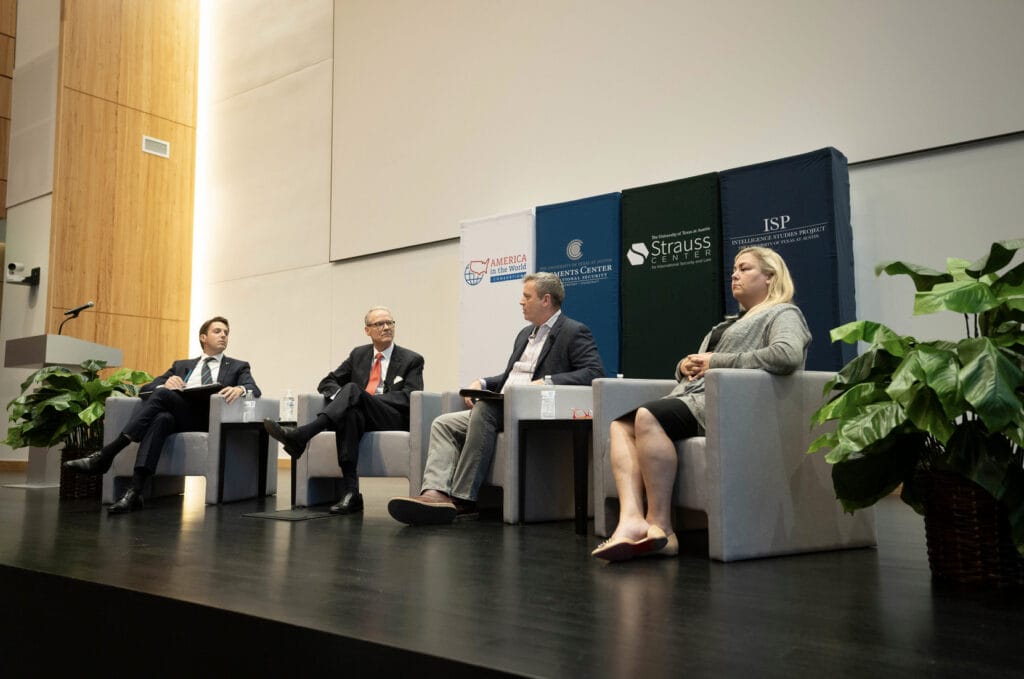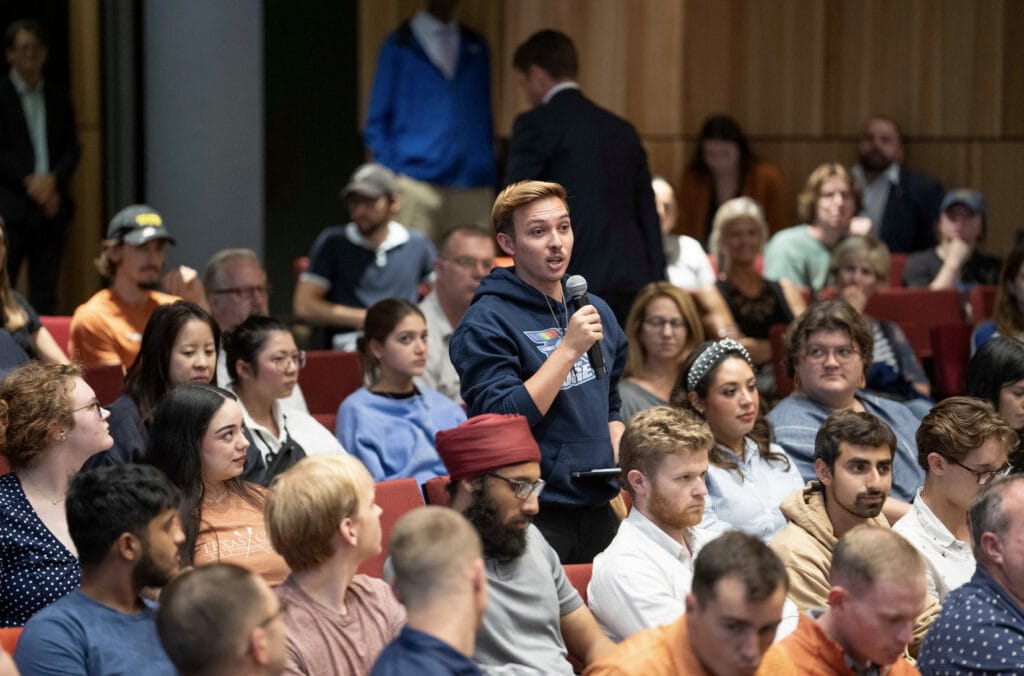The America in the World Consortium partnering with the Clements Center for National Security, the Strauss Center for International Security and Law, and the Intelligence Studies Project hosted “Israel’s 9/11? The Hamas Terrorist Attacks and the Future of Mideast Security” with Paul Edgar, Former Political Advisor for Israeli Affairs, Office of the United States Security Coordinator and Executive Director of the Clements Center for National Security, Simone Ledeen, Former Deputy Assistant Secretary of Defense for the Middle East, and Steve Slick, Director of the Intelligence Studies Project and Professor of Public Policy Practice at The LBJ School of Public Affairs. Adam Klein, Director of the Strauss Center for International Security and Law and Senior Lecturer at the University of Texas at Austin School of Law, served as the moderator.
At full capacity in the Crum Auditorium located on the University of Texas – Austin’s campus, the event kicked off with opening remarks from University of Texas Law School Dean, Robert M. Chesney. Following Dean Cheney’s remarks, each of the expert panelist offered their insights and expertise regarding the complexities of the unfolding security situation in Israel before taking questions from the audience.
To listen to the discussion in full, visit the podcast episode for Horns of a Dilemma here, or in your podcast app of choice.
Key quotes from the event include:
“Ends do not – and cannot – justify such means,” Dean Chesney said about Hamas’ attacks on Israel in early October. “This is an essential, civilizational human achievement to try and substantiate this rule.”
“And here we are again,” Director Klein began. “We are looking deep, deep into the abyss of human cruelty. We are facing uncertainty. We are facing a disordered world, where assumptions that we had made about the rules of the road, about global order, are being shaken.”
Director Klein continued, “as campus centers, it is our job – as people who have served in government office in the United States and the many experts we’re able to call on – to help the community find a forum where we can wrestle with these questions, not merely on a philosophical and moral level but, more practically, on a policy level as citizens who are ultimately called on to participate in our own government’s decision-making about these things.”
Director Slick stated, “It’s safe to conclude that Israel’s military and political leaders were certainly unprepared for these attacks. The nature of the attack speaks to that point. But, it’s too early to conclude that the attacks were unwarned or that Israel’s intelligence failed and to speculate why and how it may have failed. We should not prejudge this case.”
Slick concluded his remarks by sharing his analysis of the long-term implications of the Hamas attacks in Gaza for U.S. intelligence. “At a bare minimum, this is a stark reminder that the threat from terrorists to the U.S. and its allies was not extinguished by the deaths of Osama Bin Laden [and other terrorist organization leaders]…Our terrorist enemies are adaptable, resilient, and still lethal.”
In his comments, Dr. Paul Edgar focused on the ongoing military operations by Israel’s military in Gaza, up to the time of this discussion, and his expectations for their next steps. He made the important caveat that every panelist on stage was sharing their expertise with the limitation of what information was publicly available at the time of the event.
Dr. Edgar referenced the many individuals across the U.S., including those at the University of Texas and larger Austin community, who were traveling to Israel to join the effort. “A gentleman in his 70s, pushing his 80s…mobilized himself to get over there and to help,” Dr. Edgar described. “You have not seen this kind of mobilization in the Israeli military since the Yom Kippur War in 1973.”
“I have to say: I was wrong,” Ms. Ledeen confessed. “I’ve been doing a lot of reflection because I was one of those people who thought, ‘Hamas, they’re really bad. They’ve killed a lot of people. But, you know, now they’re dealing with a lot of bureaucracy, they’re running Gaza…’ And I mistakenly thought that’s really where they were focused and that it had tempered them a bit. It had not. It had not. They are who they always were.”
Please keep an eye out for more events as the situation in Israel develops. AWC, along with our partners, will always provide opportunities to engage experts and scholars.



